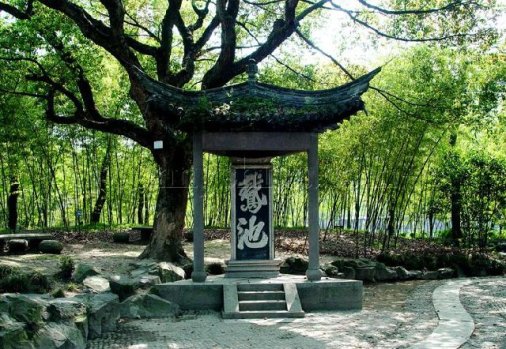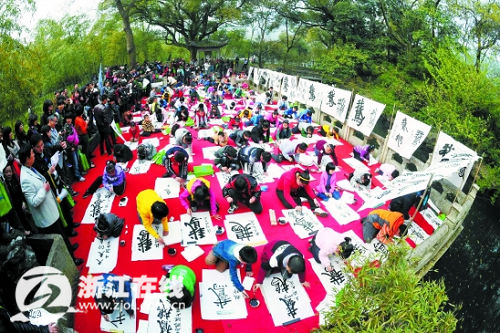 Listen to Shirley Singing the Poem in English August 6, 2011
Listen to Shirley Singing the Poem in English August 6, 2011 Listen to Shirley Singing the Poem in Chinese August 6, 2011
Listen to Shirley Singing the Poem in Chinese August 6, 2011 Listen to Shirley Introducing This Poem & Chinese Characters
Listen to Shirley Introducing This Poem & Chinese Characters Follow Shirley to Read the Poem & Chinese Characters
Follow Shirley to Read the Poem & Chinese Characters Learn the Meaning of the Poem With Shirley Together
Learn the Meaning of the Poem With Shirley Together See Shirley Created Picture & Calligraphy for the Poem June 25- 28, 2012
See Shirley Created Picture & Calligraphy for the Poem June 25- 28, 2012 See Shirley Created Picture & Calligraphy for the Poem Dec 14-15, 2011
See Shirley Created Picture & Calligraphy for the Poem Dec 14-15, 2011 See Shirley Created Picture & Calligraphy for the Poem August 4, 2011
See Shirley Created Picture & Calligraphy for the Poem August 4, 2011This is my 76th
Combined Paintingthat I have created / painted for Chinese Classical Poetry,
my 717 painting since 2003;also, it is my 109th assignment in Chinese National Academy of Arts since Oct, 2011.
It is the 3rd time that I created/painted a painting to match the Chinese classical poem
Yong E - Singing Geese .
Goose is considered one of the first domestic birds that were domesticated by human being.
In ancient China, many princes and nobility raised them as their guard birds, as similar as the guard dogs. :-)
It is said, in the Jin Dynasty (265-420), the
sage of Calligraphy -- Mr. Wang Xizhiquite loved geese. No matter where had good geese, he was interested in seeing them or bought them back and raised them.
Mr. Wang Xizhi enjoyed the qualities of geese -- do not in a hurry when they walk and be leisurely and carefree when they swim. He thought, to raise a geese could not only edify the good sentiment, but also, via learning the posture and the attitude of the geese, could help people to learn the spirit quiddity that something natural is just the beauty; to understand the arcanum of calligraphy’s writing movements.
He thought, when we hold a Chinese brush, the forefinger of us should like the head of a goose, to lift and a little bit bend; when we run the brush, we should work like a goose's webbed feet are paddling the water, then we could make the spirit to be focus on the art conception of the writing.
Here are two stories about how he loved the geese:
One morning, Mr. Wang Xizhi and his son
Wang Xianzhiwere visiting the landscape of Shaoxi. When their boat went by Xiang Village, he was attracted by the lovely style of a family of white geese who waddled and dillydally along the river bank, so that he wanted to buy them.
Then Mr. Wang Xizhi asked the Taoist nearby and wished him to sell the geese to him. The Taoist responded, if the General of the Right Army (There were 3 main armies in the ancient China, central Army, left army and right army. Wang Xizhi was a general of the right army) wanted them, please write a
Huang Ting Jing(a Scripture of Taoism) for us. Since Mr. Wang Xizhi really loved the geese, therefore, he agreed the condition of the Taoist agreeably.
This is just the story Mr. Wang Xizhi changed white geese with his calligraphy. :- )
Mr. Wang Xizhi lived in Lan Ting in today’s Zhejiang province. For raising geese, especially, he built a pool and named the it 鹅池 échí-- Geese Pool. By his Geese Pool built a stele and a pavilion.
It is said, one day, when Mr. Wang Xizhi was writing the characters 鹅池 échí-- Geese Pool, just completed the first character, 鹅池 é-- Geese, a minister came to Wang's home with a decree of the emperor, Wang had to put down his brush and went out to accept the decree. His Son, Mr. Wang Xianzhi who was also a great calligrapher found his father just wrote one character Geese, so, he took up the brush and wrote the other word Pool.
Both of the two characters are so similar, and so harmonious. Since then, the two characters on same stele by both of the father and the son became the an anecdote through the ages
Now the stele and the calligraphy Geese Pool is just in Lanting, Shaoxing, Zhejiang Province. For helping you to learn something more about it, I have attached two photos for you. In one of the pictures, more than 100 students were learning to write the Chinese calligraphy Goose by the Geese Pool on April 11, 2011.
The poem below was written by a boy who was just 7 years old in Tang Dynasty (618 -907) and it is still popular in today's China.
I had created a piece of music to match it in 2005. I do hope my effort will be some help with you to learn Chinese culture.
Main Meaning of the Poem :
Geese, geese, geese,
Bend their necks to sing to the sky,
White feathers float on the green water,
Red webbed feet paddle the clear waves.
Chinese Characters & Pronunciations :
You can clink any Chinese Character to open the New Character Board and to see its Chinese pinyin, meaning, pronunciation and follow me to read it, also, you can hit the links over to enter the Painting Column,or you can directly enter the art notes on the painting that I created for this poem to see my painting and art notes for the poem 鹅,鹅,鹅 - E(é),é,é,
曲项向天歌 - Qǔ jìng xiàng tiān gē。
白毛浮绿水 - Bái máo fú lǜ shuǐ,
红掌拨清波 - Hóng zhǎng bō qīng bō。


If you have any questions, comments or suggestions, welcome to write to
shirley@ebridge.cn or
shirleyz004@yahoo.com ,you can also publish your opinions on
Message Board . :-)
--Shirley Zhang July 2, 2012

 Listen to Shirley Singing the Poem in English August 6, 2011
Listen to Shirley Singing the Poem in English August 6, 2011 Listen to Shirley Singing the Poem in Chinese August 6, 2011
Listen to Shirley Singing the Poem in Chinese August 6, 2011 Listen to Shirley Introducing This Poem & Chinese Characters
Listen to Shirley Introducing This Poem & Chinese Characters Follow Shirley to Read the Poem & Chinese Characters
Follow Shirley to Read the Poem & Chinese Characters Learn the Meaning of the Poem With Shirley Together
Learn the Meaning of the Poem With Shirley Together See Shirley Created Picture & Calligraphy for the Poem June 25- 28, 2012
See Shirley Created Picture & Calligraphy for the Poem June 25- 28, 2012 See Shirley Created Picture & Calligraphy for the Poem Dec 14-15, 2011
See Shirley Created Picture & Calligraphy for the Poem Dec 14-15, 2011 See Shirley Created Picture & Calligraphy for the Poem August 4, 2011
See Shirley Created Picture & Calligraphy for the Poem August 4, 2011
